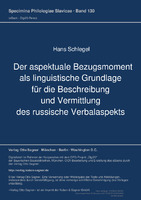Der aspektuale Bezugsmoment als linguistische Grundlage fuer die Beschreibung und Vermittlung des russische Verbalaspekts
Ein Beitrag zu Temporalitaet und Aspektualitaet
| dc.contributor.author | Schlegel, Hans | |
| dc.date.accessioned | 2019-01-10 23:55 | |
| dc.date.accessioned | 2020-01-13 14:38:01 | |
| dc.date.accessioned | 2020-04-01T11:01:59Z | |
| dc.date.available | 2020-04-01T11:01:59Z | |
| dc.date.issued | 2000 | |
| dc.identifier | 1003926 | |
| dc.identifier | OCN: 1083023309 | en_US |
| dc.identifier.uri | http://library.oapen.org/handle/20.500.12657/26161 | |
| dc.description.abstract | With the present publication on the aspeclual reference moment, the author returns to a problem that occupied the science more than three decades ago (Schlegel 1970, 1971, Scheljakin / Schlegel 1970) and has not let go since then. At that time it was a matter of a special aspect theory that would reduce the functioning of the Russian aspect to a simple principle and make the non-Slavic foreign language teacher understand it, but in the meantime it has entered into a general aspect theory - supplemented by a theory of terminativity / terminarity (T. / AT), embedded in a theory of aspectuality (Schlegel 1999 [1977]). Since the first elaborations, the field of vision has widened, the reference moment has been used (...) as a "point of reference", as a "viewing time", as a "psychic now" in the description of languages other than Russian. The theory of the reference moment has a great explanatory potential for foreign language teaching in advanced learners. | |
| dc.language | German | |
| dc.relation.ispartofseries | Specimina philologiae Slavicae | |
| dc.subject.classification | thema EDItEUR::C Language and Linguistics | en_US |
| dc.subject.classification | thema EDItEUR::C Language and Linguistics::CF Linguistics | en_US |
| dc.subject.other | Language | |
| dc.subject.other | linguistics | |
| dc.subject.other | Aspektbedeutungen | |
| dc.subject.other | aspektuale | |
| dc.subject.other | Aspektualität | |
| dc.subject.other | Beitrag | |
| dc.subject.other | Beschreibung | |
| dc.subject.other | Bezugsmoment | |
| dc.subject.other | Der Bezugsmoment im Sprachsystem | |
| dc.subject.other | Der grammatische Bezugsmoment | |
| dc.subject.other | Die Origo des Zeigfeldes | |
| dc.subject.other | Grundlage | |
| dc.subject.other | linguistische | |
| dc.subject.other | Redemoment | |
| dc.subject.other | russische | |
| dc.subject.other | Schlegel | |
| dc.subject.other | Temporalität | |
| dc.subject.other | Verbalaspekts | |
| dc.subject.other | Vermittlung | |
| dc.title | Der aspektuale Bezugsmoment als linguistische Grundlage fuer die Beschreibung und Vermittlung des russische Verbalaspekts | |
| dc.title.alternative | Ein Beitrag zu Temporalitaet und Aspektualitaet | |
| dc.type | book | |
| oapen.abstract.otherlanguage | Mit der vorliegenden Publikation zum aspeklualen Bezugsmoment kehrt der Autor zu einer Problematik zurück, die die Wissenschaftel bereits vor mehr als drei Jahrzehnten beschäftigt (Schlegel 1970; 1971, Scheljakin / Schlegel 1970) und seither nicht losgelassen hat. Ging es damals um eine spezielle Aspekttheorie, die das Funktionieren des russischen Aspekts auf ein einfaches Prinzip zurückführen und dem nichtslawischen Fremdsprachenlehrer einsichtig machen sollte, so ist diese in der Zwischenzeit in eine allgemeine Aspekttheorie eingegangen - ist ergänzt durch eine Theorie der Terminativität/Aterminativität (T/AT), eingebettet in eine Theorie der Aspektualität (Schlegel 1999 [1977]). Seit den ersten Ausarbeitungen hat sich das Gesichtsfeld erweitert, der Bezugsmoment ist (...) als "point of reference", als "Betrachtzeit", als "Psychisches Jetzt" in der Beschreibung anderer Sprachen als des Russischen genutzt worden. Die Theorie des Bezugsmoments weist ein großes explanatorisches Potential für den Fremdsprachenunterricht bei fortgeschrittenen Lernern auf. | |
| oapen.identifier.doi | 10.3726/b13180 | |
| oapen.relation.isPublishedBy | e927e604-2954-4bf6-826b-d5ecb47c6555 | |
| oapen.relation.isbn | 9783954794782 | |
| oapen.series.number | 130 | |
| oapen.pages | 231 | |
| oapen.place.publication | Bern | |
| oapen.identifier.ocn | 1083023309 |

